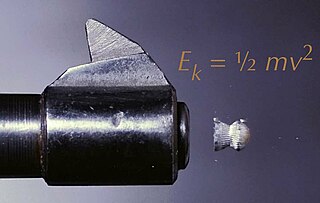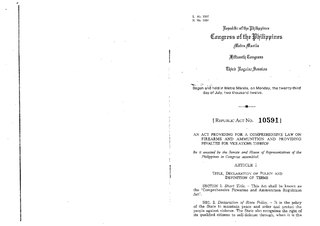Gun laws and policies, collectively referred to as firearms regulation or gun control, regulate the manufacture, sale, transfer, possession, modification, and use of small arms by civilians. Laws of some countries may afford civilians a right to keep and bear arms, and have more liberal gun laws than neighboring jurisdictions. Gun control typically restricts access to certain categories of firearms and limits the categories of persons who may be granted permission to access firearms. There may be separate licenses for hunting, sport shooting, self-defense, collecting, and concealed carry, each with different sets of requirements, privileges, and responsibilities.
Airsoft, also known as survival game in Japan where it was popular, is a team-based shooting game in which participants eliminate opposing players out of play by shooting them with spherical plastic projectiles shot from airsoft guns.

The right to keep and bear arms is a legal right for people to possess weapons (arms) for the preservation of life, liberty, and property. The purpose of gun rights is for self-defense, as well as hunting and sporting activities. Countries that guarantee a right to keep and bear arms include Albania, Czech Republic, Guatemala, Ukraine, Mexico, the United States, Yemen, and Switzerland.

Muzzle energy is the kinetic energy of a bullet as it is expelled from the muzzle of a firearm. Without consideration of factors such as aerodynamics and gravity for the sake of comparison, muzzle energy is used as a rough indication of the destructive potential of a given firearm or cartridge. The heavier the bullet and especially the faster it moves, the higher its muzzle energy and the more damage it will do.

Firearms regulation in Switzerland allows the acquisition of semi-automatic, and – with a may-issue permit – fully automatic firearms, by Swiss citizens and foreigners with or without permanent residence. The laws pertaining to the acquisition of firearms in Switzerland are amongst the most liberal in the world. Swiss gun laws are primarily about the acquisition of arms, and not ownership. As such a license is not required to own a gun by itself, but a shall-issue permit is required to purchase most types of firearms. Bolt-action rifles do not require an acquisition permit, and can be acquired with just a background check. A reason for the acquisition of a firearm is required to be issued an acquisition permit for semi-automatics. Permits for concealed carrying in public are issued sparingly. The acquisition of fully automatic weapons, suppressors and target lasers requires special permits issued by the cantonal firearms office. Police use of hollow point ammunition is limited to special situations.
Firearms regulation in Mexico is governed by legislation which sets the legality by which members of the armed forces, law enforcement and private citizens may acquire, own, possess and carry firearms; covering rights and limitations to individuals—including hunting and shooting sport participants, property and personal protection personnel such as bodyguards, security officers, private security, and extending to VIPs.
In South Africa, the Firearms Control Act 60 of 2000 regulates the possession of firearms by civilians. Possession of a firearm is conditional on a competency test and several other factors, including background checking of the applicant, inspection of an owner's premises, and licensing of the weapon by the police introduced in July 2004. In 2010, the process was undergoing review, as the police were not able to timely process either competency certification, new licences or renewal of existing licences. Minimum waiting period used to exceed two years from date of application. The Central Firearms Registry implemented a turnaround strategy that has significantly improved the processing period of new licences. The maximum time allowed to process a licence application is now 90 days.
Airsoft is a sport in which players use airsoft guns to fire plastic projectiles at other players in order to eliminate them. Due to the often-realistic appearance of airsoft guns and their ability to fire projectiles at relatively high speeds, laws have been put in place in many countries to regulate both the sport of airsoft and the guns themselves. Safety regulations in many areas require an orange or red tip on the end of the barrel in order to distinguish the airsoft gun from a working firearm. They are officially classed as "soft air devices" or "air compressed toys", depending on the jurisdiction.
The gun laws of New Zealand are contained in the Arms Act 1983 statute, which includes multiple amendments including those that were passed subsequent to the 1990 Aramoana massacre and the 2019 Christchurch mosque shootings.
In Germany, access to guns is controlled by the German Weapons Act, which adheres to the European Firearms Directive and was first enacted in 1972, and superseded by the law of 2003. This federal statute regulates the handling of firearms and ammunition as well as acquisition, storage, commerce and maintenance of firearms.
This is a list of laws concerning air guns by country.
Criminal possession of a weapon is the unlawful possession of a weapon by an individual. It may also be an additional crime if a violent offense was committed with a deadly weapon or firearm.
In Honduras, the commerce, ownership, possession and use of firearms is regulated. Escalation in crime and the use of firearms in the commission of crimes and homicides has brought political and public discourse to consider regulation of arms.
Firearms in Thailand refers to the number and types of firearms in the country in civilian (unofficial) hands and the laws and societal norms that govern their possession and use.
Gun law in the Philippines is regulated by the Firearms and Explosives Division of the Philippine National Police. In order to possess a firearm in the Philippines, a person must be at a minimum age of 18 years and pass a background check to be issued a Possession License. They must also take a firearms training and safety course. Any history of mental illnesses or domestic violence within the individual or the family will cause an applicant to have their request rejected.
During the Russian Civil War, the Soviet government allowed a variety of small arms and bladed weapons. The government had made it a point to "arm the working people", but also of disarming the exploiting classes, in the Declaration of the Rights of Working and Exploited People in January 1918.

A gel ball blaster, also known as a gel gun, gel shooter, gel marker, hydro marker, hydro blaster, water bead blaster or gelsoft, is a toy gun similar in design to airsoft guns, but the projectiles they shoot are 7–8 mm superabsorbent polymer water beads, which are often sold commercially as moisture retainers for gardening and pot/vase floriculture.
Polish law allows modern firearms ownership on a general shall-issue basis under police-issued permit for people who provide an important reason. Hunting, sport shooting, training and collecting are the most popular reasons and require membership in suitable organizations. Self-defense permits for civilians are chief exceptions to the rule, where a may-issue based permit is required. Antique black powder firearms or their replicas and most air guns are available without a permit. Firearm owners are subject to mental health and domestic violence confiscation laws resembling U.S red flag laws.
Uruguayan law allows firearm possession on shall-issue basis. With approximately 35 civilian firearms per 100 people, Uruguay is the eighth most armed country in the world and most armed in Latin America.

The Comprehensive Firearms and Ammunition Regulation Act, officially recorded as Republic Act No. 10591, is a consolidation of Senate Bill No. 3397 and House Bill No. 5484. It was enacted and passed by the Senate of the Philippines and the House of Representatives of the Philippines on February 4, 2013, and February 5, 2013, respectively. It was signed into law by President Benigno Aquino III on May 29, 2013.





